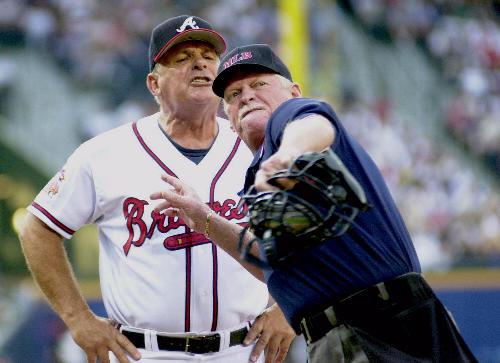quote:
Originally posted by Will:
quote:
Your last few posts indicate to that you had problems with younger of newer umpires. Most older or more expereinced coaches I know work through that.
Jimmy 03
"work through that" any suggestions? Just sit back and let them blow calls and then act arrogant"?
As a coach you work day after day with your kids.They work hard every day. coaches work hard every day. the umpire shows up works a couple of hours collects his fee and goes home.
blowing the call is one thing but the arrogance is another.
It begins with you attitude and assumptions. As most professionals know, attitude colors everything.
You work hard and the umpires just show up get paid and leave, eh?
I am willing to bet I invest more time and money in studying, training, preparing and assessing performance than most coaches or players. I spend over $2000 annually on training, including travel and lodging costs. I am spend at least $500 annually on equipment and uniform upgrades and maintanance. My non-reimbursed gas expenses are outrageous.
I attend week long camps, week-end clinics, and weekly meetings working on mechanics and rule. I keep five copies of the OBR, FED and NCAA rulebooks handy for some amount of reading or study time almost every day. (One copy each in my car, one copy each in my bedroom, one copy each in "primary" bathroom, one copy each in my home office and one copy each at work.) I possess and study the JEA, J/R and BRD "casebooks".
When I am not studying, I working as the trainer and evaluator for my association. I also spend time as an interpreter of FED rules for my portion of the state.
I get to my games early, notify the coaches the crew is there. I spend time with my partner(s) going over mechanics and any new rule interpretations or situations that might come into play.
I work hard, stay focused and try my best to ignore arrogant coaches, wise-@ss players and ignorant fans (see, I can generalize, too). Fortunately, for me, those types are far outnumbered by coaches who act professionally, players who keep their mouths closed. Most fans, however, are ignorant of rules and mechanics and, if you listem to them, can be a real pain in the @ss. I've long since learned to ignore them.
After the game, my partner and I have post-game conference and discuss what went right and what may not have. When I get home, I clean my gear and then make an entry in a log that I've kept for 30 years.
When my check comes at the end of the month, I pay my gas credit card bill, put half of what's left into an equipment and uniform account and the other half goes into a vacation fund so that I can treat my family nice for putting up with my baseball fever.
Once you adjust your attitude, you then have to realize that umpires, like coaches and players, have to start at the beginning and learn their craft. Some umpires are bound to be beginners. If, however, you are getting a steady diet of beginners, you are either coaching at a low level, or fielding a time that is not very competitive or are in any area of extreme umpire shortage.turnover, or you somehow p!ssed off an assignor along the way.
The approach you use to an umpire when you want to discuss a rules intepretation is important. Keep in mind that your goal is to get the correct interpretation, not to beat up on an umpire. Bear in mind that the correct interpretation may not always be what you think it is. Keep open the remote possibility that you may be wrong.
Request time, and, civily, ask non-sarcastic questions aimed at finding out what the umpire called and why. You need to do this in an informative manner, not challenging, provided of course that what you want is a proper ruling and not to make a show of yourself "supporting your team."
If you are not satisfied, notify the umpire you are protesting based on the rule interpretation and not on the judgement call.
Follow-up on the protest and if you are correct and umpire was wrong, politely notify his assignor, if he was not involved in the protest, so that he can educate the umpire.
None of this is magical or obscure. It begins, as I said before with your attitude and is moved along with your demeanor and focusing on what is important.
If you act on the field as you portray yourself in your posts, I have no doubt that you have problems with umpires...often. Control what you can control and you will be amazed at how that can effect those things you cannot control.
I once wrote a handout for a local HS league on "How to Approach an Umpire and Still See the Rest of the Game". PM me if you'd be interested in a copy.

